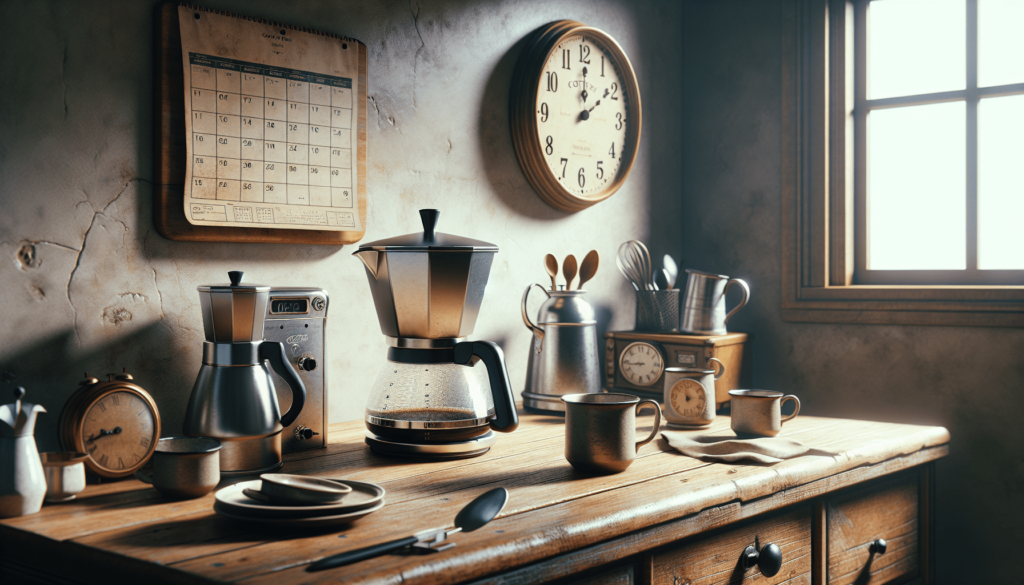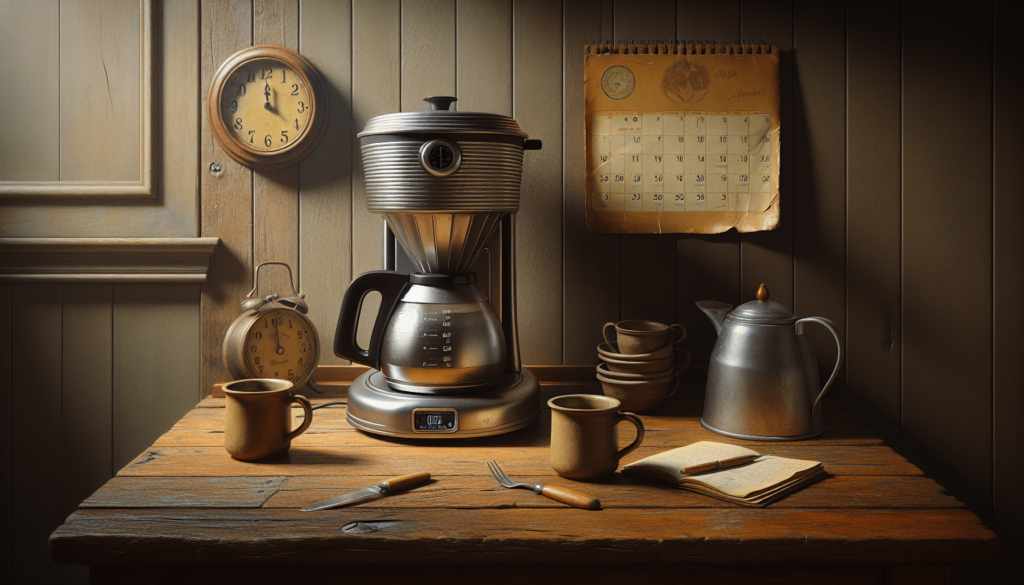Have you ever found yourself wondering, “How many years should a coffee maker last?” This is a question that many coffee enthusiasts like yourself ponder, especially when considering the purchase of a new machine. With the wide variety of coffee makers on the market today, understanding their lifespan can help you make a more informed decision.

Factors Influencing the Lifespan of a Coffee Maker
Understanding what affects the longevity of a coffee maker can save you both time and money in the long run. Several factors contribute to how long your coffee maker will remain functional and efficient.
Build Quality
One of the most significant factors is the build quality of the coffee maker. High-quality materials and robust construction often mean a longer-lasting machine. Brands known for their durable construction are usually worth the investment.
Frequency of Use
How often you use your coffee maker also plays a vital role. If you brew multiple pots daily, it will likely wear out faster compared to a machine used once a day or even less frequently.
Maintenance and Cleaning
Proper maintenance can vastly improve the lifespan of your coffee maker. Regular cleaning to remove coffee oils and mineral deposits can prevent clogging and other issues that may lead to malfunction.
Brand and Model
Some brands and models are inherently more durable than others. Research and reviews can provide insights into which models are known for their longevity.
Water Quality
The quality of water you use can also impact the machine’s lifespan. Hard water, rich in minerals, can lead to more frequent scaling, which can degrade your coffee maker over time.
Average Lifespan by Type of Coffee Maker
Different types of coffee makers have varying lifespans. In this section, we will look at the expected duration for each common type.
Drip Coffee Makers
Drip coffee makers are among the most popular types due to their ease of use and affordability. On average, a well-maintained drip coffee maker can last between 5 to 8 years.
Single-Serve Coffee Makers
Single-serve coffee makers, like those using pods or capsules, typically last around 3 to 5 years. Their lifespan can be shorter due to the frequent use of mechanical parts.
Espresso Machines
Espresso machines, especially those that are semi-automatic or fully automatic, can last between 5 to 15 years. High-end models often come with robust features and parts that extend their longevity.
French Press
A French Press coffee maker often lasts the longest, usually over 10 years, because it has no electrical components and relies primarily on manual operation.
Percolators
Percolators, whether electric or stovetop, can last between 5 to 10 years. Regular descaling is crucial to maintain their efficiency.
Signs That Your Coffee Maker is Nearing the End
At some point, even the best coffee maker will start to show signs of wear and tear. Recognizing these signs can help you prepare for a replacement.
Inconsistent Brew Strength
If your coffee starts tasting weaker or stronger without any changes to your coffee-to-water ratio, it could be a sign that the internal components are deteriorating.
Slow Brewing Time
A noticeable slowdown in brewing time often indicates that there are internal blockages or the heating element is failing.
Leaks
Leaks from the base or around the carafe are clear indicators that seals and internal components might be giving out.
Unusual Noises
Grinding, whirring, or other unusual noises during operation often mean that some parts are not functioning correctly.
Frequent Malfunctions
Regularly experiencing failures where the machine doesn’t brew at all or shuts off unexpectedly is a strong indicator that it’s time to consider a new coffee maker.

How to Extend the Lifespan of Your Coffee Maker
Proactively taking care of your coffee maker can extend its lifespan significantly. Here are some practical tips to help you.
Regular Cleaning
Cleaning your coffee maker is crucial. Here’s a basic guide:
| Component | Frequency | Method |
|---|---|---|
| Carafe and Basket | After each use | Wash with soap and water |
| Water Reservoir | Weekly | Wipe with a damp cloth |
| Descale Machine | Monthly | Use a descaling solution or vinegar and water mixture |
Using Filtered Water
Using filtered water can reduce mineral build-up, which in turn can prevent scaling and improve the machine’s efficiency.
Timely Replacement of Parts
Some parts of your coffee maker, such as filters and O-rings, may need periodic replacement. Doing so can keep the machine in optimal condition.
Proper Storage
When not in use, store your coffee maker in a cool, dry place. This prevents damage from heat and humidity.
When to Consider Upgrading
Sometimes, even with the best care, you might find it more beneficial to upgrade your machine. Here are some scenarios where you might consider upgrading:
Technological Advancements
Newer models often come with features like programmable settings, better energy efficiency, and improved brewing technology.
Change in Preferences
If you’ve developed a preference for a different brewing method, it could be a good time to upgrade. For example, switching from a drip coffee maker to an espresso machine.
Frequent Repairs
If you are constantly needing to repair your current coffee maker, it might be more cost-effective to invest in a new machine.
Energy Consumption
Older coffee makers tend to be less energy-efficient. Upgrading to a newer model can lower your energy bills.
Environmental Impact
It’s also worth considering the environmental impact when planning to dispose of your old coffee maker. Many components can be recycled, and some brands offer recycling programs.
Disposal Options
Many local recycling centers accept small appliances. Alternatively, some brands provide take-back schemes for old units when you purchase a new one.
Eco-friendly Choices
Look for coffee makers that are made from sustainable materials and designed for low energy consumption.
Recap of Key Points
Here’s a summary table to help you quickly reference the important points.
| Topic | Key Points |
|---|---|
| Factors Influencing Lifespan | Build quality, frequency of use, maintenance, brand, water quality |
| Lifespan by Type | Drip (5-8 years), Single-Serve (3-5 years), Espresso (5-15 years), French Press (10+ years), Percolators (5-10 years) |
| Signs of Wear and Tear | Inconsistent brew strength, slow brewing, leaks, unusual noises, frequent malfunctions |
| Extending Lifespan | Regular cleaning, using filtered water, timely replacement of parts, proper storage |
| When to Upgrade | Technological advancements, change in preferences, frequent repairs, energy consumption |
| Environmental Impact | Recycling options, eco-friendly replacements |
Conclusion
So, how many years should a coffee maker last? As you’ve learned, the lifespan can vary based on several factors, from the type of coffee maker to how well you maintain it. On average, you can expect your coffee maker to serve you between 3 to 15 years, with proper care potentially extending this timeline. Keep an eye on the signs of wear and tear, maintain your machine regularly, and consider upgrading when it no longer meets your needs. Ultimately, a well-chosen and well-maintained coffee maker can provide you with years of delicious coffee.
Final Thoughts
Understanding the lifespan of your coffee maker can help you make more informed decisions, maximize your investment, and ensure that your morning brew is always up to your standards. By taking care of your coffee maker and knowing when it’s time to upgrade, you’ll enjoy a perfect cup of coffee for many years to come.
